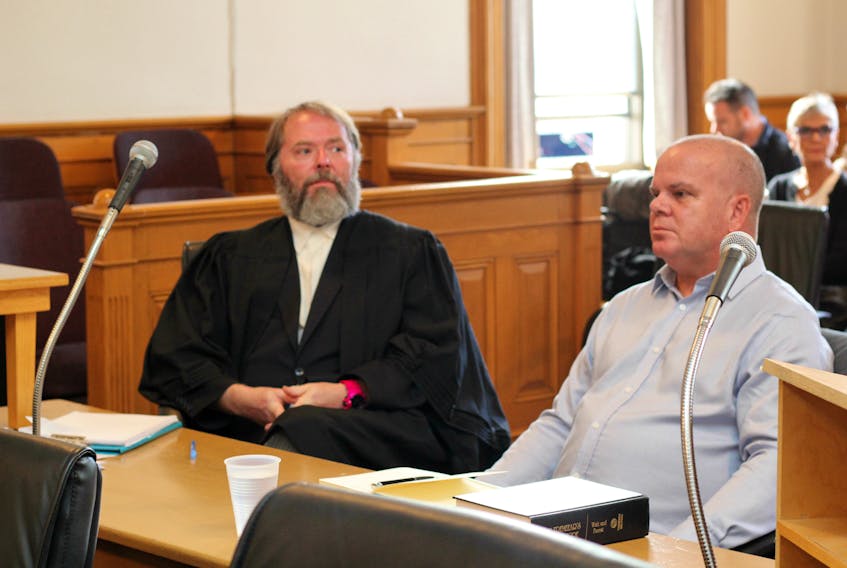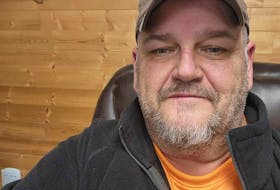ST. JOHN'S, N.L. - Nurse Stacey Kean was working a 12-hour shift in the emergency room at St. Clare’s hospital in St. John’s the night of Jan. 22, 2016. As nurse in charge of the resuscitation room – meant for the more serious ER patients — that night, she was caring for two. One of them was a woman who had arrived by ambulance a few hours earlier. The woman’s husband, Mark Rumboldt, had arrived at the same time, in a separate ambulance.
Rumboldt, 58, is charged with attempting to murder his wife, as well as administering to her a noxious thing – prescription medication.
Both Rumboldt and his wife appeared intoxicated, though Rumboldt’s condition was the least serious of the two, Kean said. Paramedics suspected a combination of prescription medication and alcohol, though they couldn’t get a clear picture of what had gone on at the couple’s home before they arrived. The woman was awake but reportedly not very responsive until she got to the hospital, and Rumboldt was drowsy but able to speak, though he wasn’t sure what had happened to him.
“When (the woman) came to me she was drowsy, but rousable,” Kean explained in Newfoundland and Labrador Supreme Court Sept. 26 in St. John’s.
Related stories:
- Prosecutor describes bizarre evidence in attempted murder case
- Trial begins Tuesday for man charged with attempting to murder woman with medication
The woman mostly kept her eyes closed as she lay on the bed, attached to an IV and a heart monitor, Kean said.
Once Rumboldt was discharged, about three hours after the couple had arrived, he asked if he could sit by his wife’s bedside in the resuscitation room. He had been there about half an hour, according to Kean’s testimony, when Kean walked by and noticed the curtain around the woman’s bed had been drawn.
“As a nurse, I prefer the curtain left open so I can have a quick glance to make sure everything is OK,” she said. “I noticed it was closed and I had left it open. I thought maybe the doctor had been in there. I went to check and see if everything was OK.”
Opening the curtain at the side of the woman’s bed, near her head, Kean said, she was surprised to see Rumboldt sitting on a chair opposite her, holding a white hospital facecloth to his wife’s mouth. He seemed concerned, Kean said, and asked Kean if his wife was breathing and if she was OK.
Kean said she checked the woman’s vitals and ensured her breathing was fine, and then saw Rumboldt move the cloth toward the woman’s chin, pulling down her lip in the process.
“I noticed a white residue on her lip and in her mouth,” Kean said. “A white milky substance with solid white pieces of what appeared to be a pill. At that point, I noticed a pill bottle on the bed next to her hand. I asked (Rumboldt) where it came from and he said she must have taken it with her.”
The bottle label indicated it contained Ativan prescribed to Rumboldt.
Kean said she asked another nurse to stay with the woman in case her condition deteriorated, while she went to find the doctor and the charge nurse. Together they returned to the woman’s bedside. Rumboldt appeared calm and answered their questions, Kean said, before being asked to leave.
One of the nurses then used her glove finger and a tongue depressor to scoop out the residue from the woman’s mouth, putting it in a specimen bottle. Kean said she asked the woman multiple times about what happened.
“She said she does take Ativan before presentations, and she hadn’t taken any that night,” the nurse said. “I asked her if she had taken anything at the hospital or if her husband had given her anything, and she said no.
At one point after Rumboldt left, the nurses found a single pill on the woman’s bed, then pulled back the sheet to reveal a bag of pill bottles in her lap. They were prescribed to Rumboldt, Kean said.
The woman later tested positive for benzodiazepines, of which Ativan is one.
Trial continues today
Wednesday marked the second full day of trial for Rumboldt, who has pleaded not guilty to attempting to murder his wife and administering to her a noxious substance (prescription drugs). Through the testimony of police officers and paramedics, the court heard his wife had called 911 just before 8:30 that evening, asking for an ambulance because her husband had taken Ativan and alcohol. When paramedics arrived at the couple’s west-end St. John’s home, they were unable to get an answer at the door, so they called the RNC for assistance.
Four police officers arrived and eventually Rumboldt’s wife was seen through a window crawling down a hallway and making her way toward the front door, which she unlocked before falling backward on a bench. She was severely impaired, by all accounts, and was escorted to the living room to be assessed.
In the meantime, police officers located Rumboldt in the bathroom, and he, too, was unwell, though much more coherent than his wife. He was unsteady on his feet and was slurring his words, witnesses said, and was brought to the living room for assessment as well.
Police and paramedics told the court they heard Rumboldt say his wife had been sad for a while and had taken 10 Ativan as well as 10 sleeping pills that night.
“He mentioned that they were trying to have a romantic evening. They had been having some troubles. She was having some trouble sleeping and he had offered her some of his medication to help her sleep,” one paramedic testified, answering questions from prosecutor Scott Hurley.
Another paramedic said the woman had told him in the ambulance that she and Rumboldt had been talking about divorcing.
“She wouldn’t elaborate on it,” he added.
Paramedics told the court they had searched the home for medications and found one bottle of medication prescribed to the woman, and multiple bottles prescribed to Rumboldt. They put them in individual bags and sent them to the hospital in the couple’s respective ambulances.
Jeremiah Best, the emergency room nurse assigned to Rumboldt when he arrived, said Rumboldt had repeatedly asked him why he was at the hospital, and wondered if his wife had drugged him.
“He said, ‘I didn’t take anything, did she give it to me?’” Best testified. I told him, “I don’t know because we weren’t there.”
Rumboldt’s lawyer, Jeff Brace, focused on issues with the witnesses’ memory, pointing out inconsistencies between their testimony and statements they made a year ago at the preliminary hearing for the case. He asked one paramedic, who testified to having seen an alcohol flask on the coffee table in the couple’s home, why he hadn’t mentioned the flask to police or at the preliminary hearing. No other witness had reported seeing the flask, Brace pointed out. The paramedic agreed that it could be a false memory.
Rumboldt’s trial continues today, Sept. 27.
[email protected]
Twitter: @tara_bradbury









